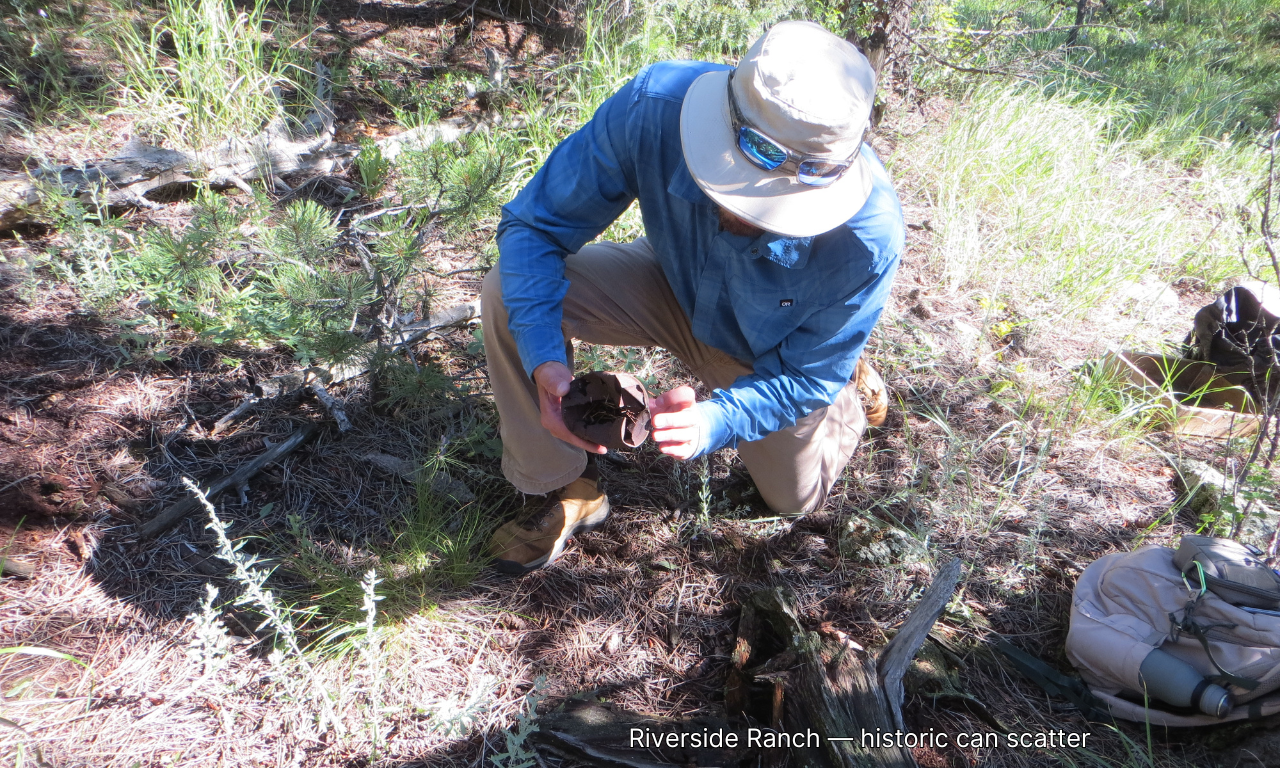On March 1, 2023, History Colorado awarded Boulder County Parks & Open Space (BCPOS) a $24,397 grant in partnership with a $5,000 BCPOS cash match to complete an intensive-level cultural resource survey on the 556-acre Riverside Ranch Open Space property, located at the end of Conifer Hill Rd. west of the Town of Lyons, up Colorado Highway 7.
What Are Cultural Resources?
Cultural resources are an aspect of a cultural system that is valued by, or significantly representative of a culture that contains significant information about a culture. A cultural resource may be a tangible entity or a cultural practice. Tangible cultural resources are categorized as districts, sites, buildings, structures, and objects. Archeological resources, cultural landscapes, and ethnographic resources can also be considered cultural resources.
Why Conduct a Cultural Resource Survey?
As good stewards of its cultural resources, BCPOS considers potential adverse effects to cultural resources prior to ground disturbance projects or other departmental activities. In the case of the Riverside Ranch Open Space, the 2024 forest-thinning project may have potential adverse effects to cultural resources. BCPOS, along with its contractor, Alpine Archaeological Consultants, completed fieldwork in July 2023 to identify any cultural resources over 50 years of age on the property in order to avoid impacts to significant cultural resources during the fuels reduction project or for any future projects, since the information can be utilized for multiple projects.
What is a Cultural Resource Survey?
A cultural resource survey is a project that is a combination of fieldwork and post-fieldwork reporting to identify and evaluate all cultural resources over 50 years of age in a specific project area, like Riverside Ranch Open Space.
Riverside Ranch Cultural Resource Survey Fieldwork
The fieldwork for the Riverside Ranch project consisted of a team of two archaeologists walking systematic transects across the entire property, that is safe to walk, to identify and document any cultural resources on the surface that follow the Colorado Office of Archaeology and Historic Preservation’s cultural resource survey manual guidelines and also meet the Secretary of the Interior’s Standards for Archaeology and Historic Preservation. Fieldwork was completed on July 25, 2023. The fieldwork documented two historic sites that are identified as a historic homestead ruin and a mine site. Several isolated finds include a 1912 General Land Office survey marker and a small concentration of historic metal cans manufactured between 1880-1920.
Riverside Ranch Open Space Short History
Boulder County acquired the Riverside Ranch property in 1990 from its owner and property developer, Bill Stasick, as a regulatory requirement for county approval for the then proposed Mountain Ridge subdivision located at Nelson Rd. and Highway 36. That subdivision has since been constructed. The transfer deal stripped all 15 development rights off the Riverside Ranch property and transferred them to the Mountain Ridge subdivision. At the time of the transfer, then Parks & Open Space Director, Carolyn Holmberg, stated in a Boulder Daily Camera article that the property it was receiving “has tremendous value as a wildlife habitat.” This transfer of development rights was one of the first major land deals to take place that utilized the then newly created county regulation that allowed for the transfer of development rights from one property to another.
History Colorado Certified Local Government Grant Funds
The U.S. Department of Interior’s Historic Preservation Fund Program provides funding for a portion of the operation of Colorado’s State Historic Preservation Office that resides within History Colorado. The National Park Service specifies that at least 10 percent of these funds be subgranted to Certified Local Governments (CLGs), like Boulder County, through the competitive CLG subgrant grant program. Currently, there are 67 CLGs across Colorado.


